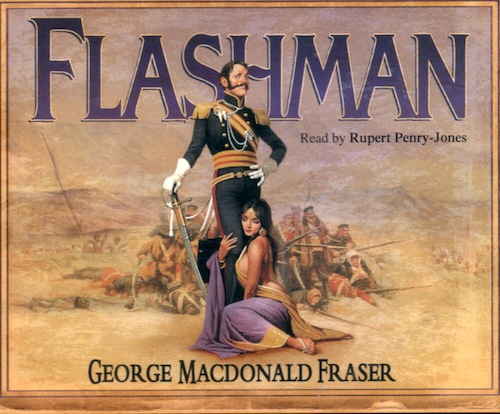Last week, in my continuing survey of funny novels, I read Flashman by Geroge MacDonald Fraser. Formally, it is a comic novel, but really it is a historical adventure story. It is the first-person account of the adventures of one Harry Flashman, originally a bully in Tom Hughes’s novel School Days, and now in Fraser’s imagination a hero of the first Anglo-Afghan War. Flashman has three skills: foreign languages, horseback riding, and a powerful reflex for running away. He is a poltroon, but his cowardice always winds up furthering his reputation as a hero. It all ends well for Flashy even though he conducts himself despicably on pretty much every page, so Flashman is a comedy. It is also a brutal rendering of early 19th-century Britannia, replete with rape, the n-word, and generally bad values. So how should I feel about liking it?
Because I am a poor scholar, I initially thought that Flashman was written in 1986. I read the hero’s chauvinist antics and easy dismissals of the weak and poor as straight satire, the bitter wisdom of the late Reagan years repudiating the depredations of old. Then, about midway through, I learned that Flashman was written in 1966 by the same guy who wrote Octopussy. In that context, Flashy’s gleeful lack of empathy for anyone who is not a wealthy white playboy seemed suddenly less satirical.
Don’t get me wrong: the eponymous narrator says on page one that he is a terrible person, and he reiterates it throughout in both word and deed. This presentation of himself is not a Huckleberry Finn-style irony, either. Unlike Twain’s novel, which makes it clear that Huck is a good person even though the standards of his time have convinced him he’s bad, Flashman is a manifestly awful person whom the standards of his time have declared good.
It would read as a clean indictment of pre-Victorian British society, except Flashy is so likable. You don’t root for him when he’s slapping his dad’s girlfriend or forcing himself on an Afghan belly-dancer, but then he’s running away from murderous Gilzais and you’re right behind him again. Partly it’s because he’s honest. Flashman is very open, in his narration, about being a coward and a bully. But mostly he is a rascal whom you cannot help but side with.
This presents the modern reader with a problem. Flashman is not only the kind of person who beats up people who like books, but also an embodiment of all the values the modern age has rejected. He regards women, non-English people and the poor as his subordinates. He’s skeptical about the Afghan war and the competence of British military officers, but he seems generally enthusiastic about the British empire and its projects. Pretty much everything fun that happens in Flashman results from the main character being a dick, and then in the end things are great for him and we’re happy.
So the sixty-dollar question: are we happy because Flashman succeeds while being a scumbag, or are we happy in spite of that?
It seems dishonest to suggest the latter. There are plenty of adventure stories with daring escapes and vivid historical detail, and I don’t like them as much as I like Flashman. The hero’s bullying and cowardice are such an integral part of the story as to constitute it’s premise—it’s all about one minor villain from a Hughes novel, after all—and I don’t think I’m filtering out that premise as an annoyance. I am forced to acknowledge that Flashman is thrilling in part because the hero is so awful.
Here I reiterate that I do not espouse any of Flashy’s values, except possibly his interest in foreign language. I don’t want to be like him. Yet it is undeniably entertaining to watch such a comically bad person succeed, and his cavalier lack of empathy provides a transgressive thrill. It’s moments like this I am glad that the people Flashman inflicts himself upon are fictional, except Flashman is built around historical events.
He may be a villain now, but much of what makes Flashman problematic were the central values of 19th-century England. A time traveler from 1846 would likely be more troubled by his cowardice than his rapiness. Does this make Flashman a clever discourse on the mutability of ostensibly timeless virtues, or an atavistic indulgence? I’m not sure that it’s either. It may just be a rad adventure story that tells us something about the novel’s ability to hit the gut rather than the head. You should read it.




